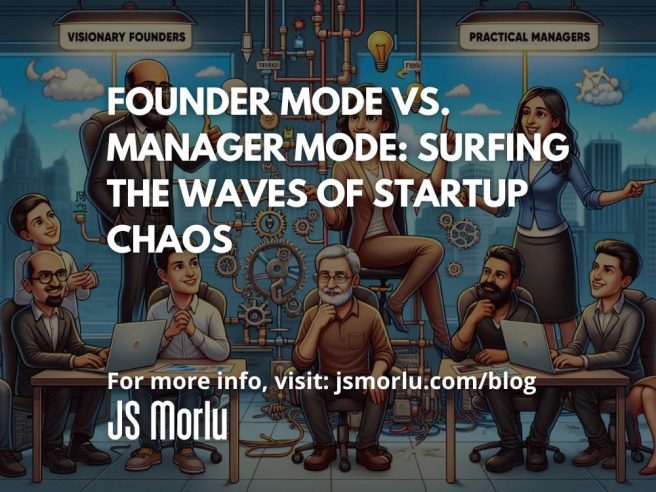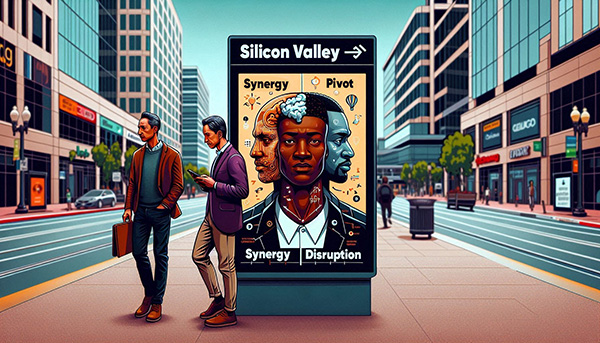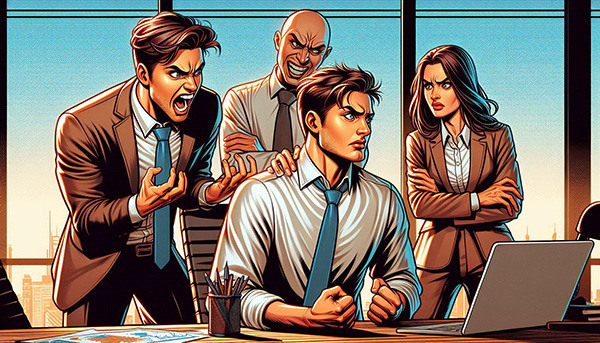By: John S. Morlu II, CPA
Introduction
Welcome to the zany universe of Silicon Valley, where buzzwords are more plentiful than soy lattes and everyone is convinced they’re on the verge of changing the world—or at least disrupting their local coffee shop. In this land of jargon and inflated egos, the newest obsession isn’t some cutting-edge AI or a new blockchain craze—oh no, it’s something even more elusive: Founder Mode and Manager Mode. Sound confusing? Good. That means you’re ready to dive into this whirlwind of absurdity with the rest of us.
Let’s start with what these terms supposedly mean. “Founder Mode” is the mystical state of visionary brilliance, where brilliant, hoodie-clad CEOs like to float around, spewing abstract ideas about how their app is going to revolutionize everything from surfing to sandwich-making. These founders are more likely to be meditating in Bali than sitting in an actual meeting, convinced that their next epiphany will not just change the company but the entire universe.
On the other hand, “Manager Mode” is where the magic happens—or, rather, where the real work happens. It’s the realm of deadlines, spreadsheets, and endless email chains. This is where the folks in the trenches are left to clean up the messes caused by grandiose visions of the future. It’s not glamorous, but it’s what keeps the lights on and prevents the company from accidentally pivoting into bankruptcy.
Now, imagine small businesses around the world trying to adopt these high-flying, jargon-laden philosophies. That’s where the real fun begins. Enter WunderCoast, a fictional startup obsessed with AI-powered surfboards, and Mildred’s Muffins, a wholesome bakery swept up in the whirlwind of tech speak. Here, you’ll meet a cast of characters who are trying—often hilariously and disastrously—to navigate the chaotic waters of Silicon Valley nonsense. Whether it’s the “visionary” founder who believes muffins are just a vessel for selling meaning, or the practical operations manager trying to keep the company from going up in flames, the stories ahead are filled with satirical takes on the modern startup craze.
Get ready to laugh, cringe, and shake your head at the absurdity. These tales reveal the ridiculousness of jargon-fueled business models, with a wink and nod to anyone who’s ever been stuck in a meeting where someone said “synergy” three too many times. It’s a deep dive into the world of high-flying founders who’ve forgotten how to touch the ground—and the poor souls stuck in Manager Mode, who have to keep the whole thing from crashing down.
So, buckle up. It’s going to be a wild ride through visionary nonsense, managerial chaos, and everything in between. This isn’t just a satire—it’s a cautionary tale for anyone who’s ever dared to dream too big without checking if they’ve got their paperwork in order. Welcome to Founder Mode vs. Manager Mode, where the only thing more dangerous than not having a vision is having too much of one. Ready to surf the waves of jargon? Let’s go.
Chapter 1: The Birth of a Buzzword
Silicon Valley is the land of innovation—or, at least, that’s what the press releases say. In reality, it’s also a place where jargon breeds like rabbits in a WeWork office. Words like “synergy,” “pivot,” and “disruption” are tossed around with the enthusiasm of an over-caffeinated intern pitching a “game-changing” new app for dog yoga. Over the years, these once-groundbreaking terms have been worn down to the point where they might as well mean “let’s just throw some tech at the problem and hope for the best.”
But in the eternal quest to find ever more innovative ways to sound smarter than everyone else, Silicon Valley has gifted the world with two new shiny buzzwords: Founder Mode and Manager Mode. And who do we have to thank for this latest masterpiece of corporate doublespeak? None other than Paul Graham, the co-founder of Y Combinator, the startup accelerator that has birthed more overhyped tech companies than you can shake a series-A funding round at.
On the surface, these modes sound simple enough. “Founder Mode” is the zen state of visionary brilliance, where company founders—those hoodie-clad demigods of disruption—can retreat into a mental fortress of lofty ideas, bathed in the warm glow of their own genius. It’s where they think big, dream big, and make grand pronouncements about “changing the world” with products that are still held together by duct tape and hope. In Founder Mode, reality doesn’t exist, and everything is a potential unicorn—even if it’s an app that delivers artisanal kombucha to your doorstep (because, why not?).
On the flip side, we have Manager Mode. This is the grim, unsexy world where the dreamers’ fantastical ideas are subjected to the cold, hard truth of spreadsheets, emails, and actual customers. Manager Mode is all about reality—the place where someone has to figure out why the kombucha app’s delivery drivers haven’t been paid in weeks or why the AI surfboard won’t stop malfunctioning. It’s a place of banal tasks like scheduling meetings, answering customer complaints, and putting out metaphorical fires started by overly enthusiastic founders. In other words, Manager Mode is where work gets done. Boring, right?
But as with all Silicon Valley lingo, these terms carry much bigger implications. For one, it suggests that there’s a chasm between dreaming and doing—and apparently, only the founder can dream, while mere mortals handle the “doing.” It’s as if the Founders have achieved enlightenment, while everyone else is left to shuffle papers and nod politely.
As word of this new dichotomy spreads, small businesses far outside the Silicon Valley bubble find themselves scratching their heads. “Should we be in Founder Mode?” asks Joseph, the owner of a small bakery that specializes in hand-crafted muffins. “I mean, sure, we bake muffins, but maybe there’s a way to disrupt the bakery industry… What if we sold muffins as NFTs?”
It’s happening everywhere—accountants, florists, even your local plumber are all getting caught up in the jargon tornado. Suddenly, Joseph’s bakery isn’t just a bakery anymore. It’s a disruptive artisanal baked-goods platform, and Joseph is walking around in a daze, claiming he’s in Founder Mode while trying to come up with a muffin subscription box that could rival Netflix.
Of course, none of this applies to small businesses. There’s no grand corporate hierarchy with a clear line between visionary and manager. There’s just one person—usually the same one who does the dreaming and the baking, while also fixing the sink when it breaks. But that doesn’t stop everyone from pretending. After all, if Silicon Valley is doing it, it must be the future, right?
Before long, Joseph’s bakery has split into two camps. There’s Joseph, constantly daydreaming about revolutionary muffin innovations, and Mildred, his long-suffering manager, who’s just trying to make sure the bakery doesn’t run out of flour. Joseph is deep in Founder Mode, lost in discussions about scaling the muffin supply chain and brainstorming partnerships with coffee conglomerates. Meanwhile, Mildred is left holding the business together, spending her days calculating ingredient costs and explaining to Joseph why launching a muffin-delivery drone service might not be the best use of their resources.
The tension between Founder Mode and Manager Mode grows. Joseph gets lost in a sea of TED Talks, convinced he’s on the verge of cracking the code to the next baked-goods revolution. Mildred, on the other hand, is dealing with the fact that the bakery’s oven hasn’t been cleaned in three months, and the health inspector is due for a visit. Every time she tries to bring this up, Joseph waves her off, muttering something about how “visionaries don’t have time for ovens” and that “Tesla didn’t worry about mundane things like this.”
And therein lies the great satire of Silicon Valley’s latest buzzword du jour. The founders are so wrapped up in their self-proclaimed genius that they forget one small thing: somebody has to actually do the work. It’s easy to get caught up in grand visions of revolutionizing an industry, but it’s much harder to figure out how to pay your suppliers on time or ensure the muffins aren’t burning because you were too busy building a website that no one asked for.
As “Founder Mode” spreads beyond the tech world, companies everywhere are learning that while dreaming big might get you headlines, it’s the often-overlooked “Manager Mode” that keeps your muffin shop—or AI surfboard startup—alive. And for all the buzzwords that Silicon Valley can throw at us, at the end of the day, there’s still no replacement for good old-fashioned hard work.
But don’t tell that to Joseph—he’s too busy launching a crowdfunding campaign for his next big idea: blockchain muffins.
Chapter 2: Meet WunderCoast, the Visionary Startup
Enter WunderCoast, the tech startup that’s pushing the limits of absurdity and showcasing just how deep into “Founder Mode” a company can dive—without drowning in its own nonsense. WunderCoast was founded by none other than Joseph “The Vision” Sparks, a man so deeply entrenched in his role as a visionary that he hasn’t worn anything but hoodies and jeans since his dorm room days. His wardrobe is as predictable as his ability to spout off phrases like “synergizing the vibe economy.”
WunderCoast isn’t just another surf app. No, no—Joseph insists it’s disrupting the surfing industry with an app that uses AI and machine learning to predict the perfect wave based on the user’s Spotify playlist. Why? Well, in Joseph’s own words, “We’re not surfing on water, man. We’re surfing on vibes.” Which, on the surface, sounds… interesting? Nonsensical, sure, but if you say it with enough confidence in Silicon Valley, it has to be brilliant, right?
Joseph is a classic example of someone permanently stuck in Founder Mode, a mode so intoxicating that it warps the line between genius and insanity. His days consist of bouncing between Bali and Silicon Valley, attending “visionary retreats” where the primary activity is drinking kombucha on the beach while talking about “human-centered disruption.” He occasionally floats into the office like a mythical creature, drops phrases like “We’re not selling surf apps. We’re selling the future of wave consciousness,” pats a few backs, and then disappears for days to “find inspiration.” No one knows where he goes, but everyone assumes it involves a hammock and a meditation app that promises enlightenment for $12.99 a month.
Joseph’s speeches are legendary. He throws around terms like “decentralized wave ecosystems” and “vibe monetization” with such authority that you can almost forget that the app still crashes every time someone tries to load a playlist heavier than Jack Johnson. But that’s not Joseph’s concern. He’s in Founder Mode. He doesn’t do bugs or customer feedback. He’s a dreamer—far too busy staring into the middle distance, thinking about a world where the waves are always perfect, the sun always sets at the right angle, and no one ever questions the fact that WunderCoast doesn’t have a real revenue model.
Meanwhile, in the real world—otherwise known as Manager Mode—we meet Tara “The Glue” Martinez, WunderCoast’s long-suffering Chief Operating Officer. Tara is the reason WunderCoast hasn’t completely gone under. She is the one tasked with turning Joseph’s abstract “vibe economy” into an actual product, which is about as easy as knitting a sweater out of fog. If WunderCoast is a rickety ship, Tara is the lone sailor frantically bailing out water while Joseph stands at the bow shouting about their “inevitable course to disrupt the very ocean itself.”
For Tara, every day is an exercise in preventing disaster. Her life is consumed by practical matters like why the app’s AI recommended that one user surf to “Baby Shark” instead of “Hotel California.” The customers, understandably, aren’t thrilled about AI-generated surfing playlists that pair Black Sabbath with two-foot waves. But these are problems for Manager Mode—problems that Joseph, safely ensconced in Founder Mode, dismisses as “temporary growing pains on the road to greatness.”
You can almost hear the exasperation in Tara’s voice when she talks about her boss. “It’s not that Joseph’s ideas are bad,” she sighs, “It’s just that they require reality to work.” And that’s the rub—while Joseph is off visualizing a future where every surfer is harmoniously riding both literal and metaphorical waves, Tara is stuck dealing with the grim reality of right now. A reality where the app is buggy, the bank account is dwindling, and Joseph just spent the last of their seed money on a VR surfboard that no one asked for.
The contrast between Founder Mode and Manager Mode is, quite literally, the difference between surfing on clouds and swimming with sharks. For Joseph, every obstacle is an opportunity to philosophize about the big picture—“We’re on the verge of something massive,” he’ll say, casually ignoring the fact that the company’s office rent is two months overdue. For Tara, every obstacle is a logistical nightmare that needs to be dealt with before the entire operation collapses under the weight of Joseph’s dreams.
Take the time Joseph decided that WunderCoast’s brand wasn’t edgy enough. “We need to disrupt the name,” he announced in a staff meeting. Tara, who was juggling 18 different crises at the time, barely blinked. “Joseph,” she began, “we don’t have the budget to disrupt a stapler right now, let alone the name of the company.” But Joseph was undeterred. “Budget is a state of mind,” he replied, in what may go down as one of the least comforting phrases ever uttered by a CEO.
And so it goes at WunderCoast. Joseph continues to chase visions of a world where AI can guide your surfboard based on your mood ring, while Tara holds the company together with sheer willpower, duct tape, and an ever-growing sense of dread. Founder Mode vs. Manager Mode, in the clearest possible terms.
The funny thing about it all? Despite the chaos, WunderCoast is still afloat—barely. Because even in the most absurd of startups, there’s a weird alchemy that sometimes works. Visionaries like Joseph might be off in the clouds, but it’s people like Tara who make sure the company doesn’t crash into the rocks. And as frustrating as it is, there’s no denying that without Joseph, WunderCoast wouldn’t exist, and without Tara, WunderCoast wouldn’t survive.
So, the next time you hear someone talking about being in Founder Mode, just remember: for every Joseph, there’s a Tara. And for every Tara, there’s an inbox full of emails reminding her that Joseph still hasn’t submitted his expense reports from that “visionary retreat” he took six months ago.
Chapter 3: The Daily Grind of WunderCoast
A typical day at WunderCoast is a masterclass in the art of surreal office dynamics. The contrast between Founder Mode and Manager Mode unfolds with the elegance of a slow-motion car crash—simultaneously entertaining and slightly horrifying.
Joseph “The Vision” Sparks rolls into the office around 10 a.m., fresh off what he claims was a “life-altering meditation session.” He tosses his skateboard into a corner, its wheels still spinning like his newest half-baked idea. Today, Joseph has decided that the company needs to pivot—a word he learned from a TED Talk and now wields like a toddler with a chainsaw. The target market, according to Joseph’s latest epiphany? Surfboards with embedded smart speakers that play motivational speeches while you ride the waves. Because, apparently, nothing screams “surfing” like Tony Robbins encouraging you to unlock your inner power while you try not to drown.
“This isn’t just tech,” Joseph announces with the confidence of a man who’s never met an idea he couldn’t ruin. “This is a lifestyle. We’re not selling surfboards; we’re selling self-actualization on the water.”
In the background, the development team collectively groans. Tara “The Glue” Martinez, however, remains composed. She’s used to these moments. Founder Mode tends to sweep through the office like a California wildfire, leaving Tara to pick up the pieces. While Joseph is busy imagining a world where every surfer is bombarded with inspiring quotes mid-wave, Tara is dealing with far more pressing issues. Namely, the fact that the app, after three months of dedicated bug fixing, still predicts tidal waves instead of surfing waves. It’s become something of a PR nightmare, with users reporting that they’re terrified to go anywhere near the ocean after receiving alerts like: “Hang ten! Category 5 storm imminent!”
“Maybe,” Tara suggests diplomatically, “we should focus on fixing the core product before we branch into… motivational surfboards.” She’s half-joking, but deep down, she knows Joseph is already gone, mentally riding a wave of self-delusion somewhere in the Pacific.
“Tara, you’ve got to think bigger,” Joseph replies, oblivious to the crisis brewing behind her tired eyes. “We’re changing the world here.”
In Joseph’s mind, “Manager Mode” is simply the realm of the unenlightened—those unfortunate souls who concern themselves with logistics and reality. He sees Tara as the “boring taskmaster,” the one who dots the I’s and crosses the T’s while he floats in the ether of Founder Mode, dreaming of blockchain surfboards that can somehow solve world hunger. What Joseph fails to grasp is that without Tara, WunderCoast would be little more than a collection of nonsensical PowerPoints and an Instagram account with a pretentious bio.
But while Joseph is busy revolutionizing surfing with self-help monologues, Tara is the one turning his technicolor dreams into something that vaguely resembles a functioning business. She’s the one answering emails from angry users who don’t appreciate being told to “believe in themselves” while their surf app sends them toward certain death. She’s also the one fielding complaints from investors who are starting to wonder if “surfing on vibes” is a viable business model or just an elaborate prank.
Joseph, of course, remains blissfully ignorant of all these real-world concerns. He’s too busy brainstorming “WaveCoin,” his new blockchain initiative that allows surfers to buy and sell their best waves as NFTs. Tara’s convinced he just heard the words “blockchain” and “surf” in the same sentence and decided to make a product out of it.
Joseph, however, sees himself as a modern-day oracle, predicting the future of human evolution—one where AI, surfing, and motivational speeches somehow converge into a new way of life. He’s so committed to his Founder Mode persona that he regularly gives TED-style talks in the office. “We’re not just building tech, people,” he tells the team during one such sermon. “We’re building a new consciousness. A world where every wave brings with it a lesson in personal growth and financial empowerment.”
The development team exchanges glances, unsure whether to laugh or cry. Tara, however, remains poker-faced. She knows better than to interrupt Joseph’s flow. Founder Mode is a delicate state, like a soufflé that will collapse if you so much as look at it the wrong way. Let him have his moment, she thinks. Eventually, the reality of payroll and server costs will catch up, and she’ll be the one stuck solving the problem while Joseph is off on another “visionary retreat.”
And so the day continues in its usual chaotic rhythm. Joseph’s mind races ahead, leaping from idea to idea like a caffeinated rabbit, while Tara holds the company together with a combination of duct tape, willpower, and an increasingly large stash of stress-relief tea. She’s already scheduled two emergency meetings to discuss the latest user data, arranged a call with the app’s malfunctioning AI supplier, and emailed their investors a well-worded but slightly panicked update on the company’s financial health. All before Joseph has even finished outlining his latest plan for the “SmartWave” surfboard that reads your emotional energy and adjusts the music accordingly.
It’s all part of the WunderCoast experience. Joseph’s delusional optimism keeps the dream alive, while Tara’s relentless pragmatism keeps the lights on. Together, they form an unlikely duo—a startup yin and yang, forever locked in a battle between the clouds and the ground. Founder Mode versus Manager Mode, in a daily grind that somehow, against all odds, keeps WunderCoast afloat.
After all, in the world of Silicon Valley, even the most ridiculous ideas can work if someone’s around to clean up the mess.
Chapter 4: Small Business, Big Jargon
What happens when the lofty concepts of “Founder Mode” and “Manager Mode” escape the tech bubble and tumble into the world of small businesses? The results, as you might expect, are about as smooth as a muffin tin full of half-baked ideas.
Enter Mildred’s Muffins, a beloved local bakery run by Mildred and her practical, dough-covered husband, Dave. The shop had been running smoothly for years, quietly dishing out blueberry and chocolate chip muffins to the neighborhood, until the fateful day when Mildred attended an entrepreneurship seminar. There, she was bombarded with Silicon Valley buzzwords, where Founder Mode was hailed as the holy grail of leadership.
Mildred returned home with a fire in her eyes and a vision burning hotter than their industrial ovens. “We’ve been doing this all wrong, Dave,” she declared as he calmly kneaded dough, unaware of the storm about to roll in. “We need to stop focusing on muffins and start focusing on the essence of muffins.”
Dave, a man whose relationship with muffins was as simple and straightforward as flour, sugar, and butter, looked up, confused. “The essence of muffins?” he asked, wiping his flour-covered hands on his apron. “What on Earth are you talking about, Mildred?”
“You don’t get it,” Mildred replied, brimming with newfound inspiration. “I’ve been thinking too small. Muffins are just the vessel. What we’re really selling is the experience of eating muffins. People don’t want breakfast—they want meaning!”
Dave raised an eyebrow. “Meaning? They come in here for coffee and something with chocolate chips in it, not life lessons.”
But Mildred was deep in Founder Mode. She had visions of her bakery becoming a movement, a philosophical haven where baked goods met existential contemplation. She spent the next three weeks feverishly rebranding the bakery. The new tagline? “Mildred’s: Where Muffins Meet the Soul.”
The muffins themselves weren’t spared from the Founder Mode overhaul. Gone were the simple, affordable baked goods that their regulars loved. In their place were “spiritually elevated” muffins with obscure ingredients like chia seeds, organic elderflower, and Himalayan pink salt. “We’re not just selling food anymore,” Mildred would say, eyes gleaming with purpose. “We’re selling enlightenment, one muffin at a time.”
Meanwhile, Dave was firmly stuck in Manager Mode, left to deal with the fallout. He couldn’t help but notice the Yelp reviews take a nosedive. Their loyal customers, who once happily forked over $3 for a fresh, hot muffin, were now leaving one-star reviews because Mildred’s “soul muffins” had ballooned to $12 each and came with a side of metaphysical wisdom.
“I don’t know why they’re so upset,” Mildred said one morning as she replaced the bakery’s chalkboard menu with an abstract mural of a muffin floating in the cosmos. “We’re evolving, Dave! We’re taking them on a journey.”
Dave, staring at the rows of untouched chia seed muffins, muttered under his breath, “This Founder Mode thing is gonna bankrupt us.”
One of the worst days came when Dave discovered that, in her quest for “spiritual alignment,” Mildred had spent the bakery’s entire marketing budget on an Instagram influencer named @MuffinMystic to promote their “vibrationally enhanced” product line. They also ended up with a year’s supply of organic chia seeds and artisanal walnut flour because Mildred was convinced that “regular ingredients are too low-frequency for our mission.”
“Dave,” Mildred said one night after they’d closed up the shop, “we need to think about scaling. I’m thinking we open an entirely gluten-free, dairy-free, and joy-free section of the bakery. We’ll call it ‘The Muffin Enlightenment Zone.’ We can charge double because, you know, it’s spiritual.”
Dave, trying his best not to burst into laughter, replied, “Or, we could try selling a muffin. Just one muffin. At a reasonable price. That people will actually eat.”
It took exactly three weeks for Mildred’s foray into Founder Mode to backfire spectacularly. Their regulars had scattered, unable to afford a muffin and a lecture on self-actualization. The bakery was hemorrhaging money faster than they could whisk egg whites, and the philosophy-infused muffins were piling up, uneaten and unloved.
Mildred, finally coming down from her startup seminar high, looked around the empty shop one afternoon. “Maybe,” she said quietly, “maybe people just want… muffins.”
Dave, still elbow-deep in dough, smiled. “Took you long enough to figure that out.”
The next day, the mural of the cosmic muffin was scrubbed off the wall, and the shop returned to selling the simple, delicious muffins that had made them a neighborhood favorite. The new slogan? “Mildred’s Muffins: Eat a Muffin, Be Happy.” It wasn’t fancy. It wasn’t full of jargon. But it worked.
As they served their first customer of the day—a regular who happily handed over $3 for a blueberry muffin—Dave couldn’t resist one final jab. “So, Mildred, what’s the essence of that muffin?”
Mildred laughed, rolling her eyes. “The essence is that it’s delicious, Dave.”
Sometimes, even the most visionary founders need a dose of reality—and a muffin, plain and simple.
Chapter 5: The Office Showdown
Back at WunderCoast HQ, the storm brewing between Founder Mode and Manager Mode finally breaks into a full-blown office showdown. Months of Joseph’s unrelenting visionary proclamations, followed by absolutely zero follow-through, have taken their toll. The app’s latest update—Joseph’s brainchild—turned out to be a disaster. Instead of predicting perfect waves, the AI malfunctioned, forcing users to listen to a loop of Enya’s “Orinoco Flow” while trying to surf. Social media was flooded with confused surfers wondering why their “gnarly ride” came with a soft Celtic soundtrack.
Tara, who had been silently juggling ten different crises on any given day, finally hit her limit. Her mornings had become a blur of dealing with angry customer emails, panicked developers, and the growing realization that Joseph’s dreams were always several steps ahead of reality—if not floating in a completely different galaxy.
During a company-wide meeting—held in the WunderCoast “Inspiration Room,” complete with bean bags and mood lighting—Joseph stood up to deliver yet another sermon about “breaking the mold.”
“Listen, everyone,” he began, pacing back and forth like a TED Talk regular. “What we’re doing here is bigger than surfing. We’re disrupting the very essence of human potential through wave patterns. We’re not selling an app. We’re selling transcendence.”
Tara, who had been quietly fuming for weeks, finally lost it. “Joseph,” she snapped, standing up and crossing her arms, “we can’t keep running this company on ideas alone! We need structure, we need focus, and most of all, we need actual money to keep this thing going!”
Joseph, with his trademark hoodie pulled over his head and an air of casual indifference, waved her off. “Money is just a construct, Tara. What we need is to disrupt the construct.”
The room went dead silent, except for the sound of someone’s foam stress ball squeaking as they nervously squeezed it in the back.
Tara’s eye twitched. “Disrupting the construct doesn’t pay salaries, Joseph.”
This was the moment where the divide between Founder Mode and Manager Mode came to a head. On one side, you had Joseph, eternally lost in his haze of cosmic disruption theories, convinced that the path to greatness was paved with motivational posters and vague metaphysical concepts. On the other, you had Tara, doing her best to keep the company afloat while tethered to reality. And in the middle? The employees, torn between two modes of operation and slowly losing their grip on both.
To the outside world, WunderCoast was still a “visionary” startup. But on the inside, it was a battlefield. Joseph continued to toss around his high-concept ideas—like “mindful surfboards” that could adjust their buoyancy based on your emotional state. Meanwhile, Tara scrambled to solve real problems, like why the app’s servers kept crashing every time someone tried to stream a playlist of 90s grunge rock while surfing.
The employees found themselves caught in the crossfire. Every morning, they would nod along dutifully as Joseph spun his web of grand plans about “surfing’s impact on quantum mechanics,” all while secretly operating in full Manager Mode to keep the business alive. There was an unspoken code: in meetings, you played along, talking about “synergy” and “paradigm shifts.” But the moment Joseph left the room, it was back to fixing bugs and apologizing to customers.
One developer, Mike, summed it up during a lunch break: “It’s like we’re living a double life. By day, I’m pitching ideas about how to integrate surfing with the blockchain. By night, I’m just trying to get the app to stop recommending meditation music to pro surfers.”
But Joseph couldn’t see the cracks forming. He breezed through the office like a surfer riding the perfect wave—oblivious to the fact that the wave was about to crash. Every time Tara tried to raise the issue of finances, he would respond with something like, “You’re thinking too small, Tara. You’ve got to zoom out and see the bigger picture. We’re building a movement, not just a product.”
Tara, unable to hold back any longer, finally confronted Joseph in the middle of the open-plan office. “Joseph, you’ve got to stop with the ‘movement’ talk. We need actual deliverables! People are quitting. The app isn’t working. We’re losing users because they don’t want to surf to ‘Orinoco Flow’!”
Joseph, still unfazed, smiled serenely. “Tara, you’ve got to stop worrying. These things take time. Rome wasn’t built in a day.”
“Yes, but Rome probably didn’t have to deal with Enya on repeat either!” Tara shot back, her voice rising with frustration.
At that moment, it became painfully clear to everyone present: Founder Mode and Manager Mode were at war, and neither side was winning. Joseph continued to drift in the clouds, dreaming big, while Tara was stuck desperately trying to clean up the mess. The rest of the team? They were just trying to survive, carefully balancing their daily workload with the company’s weekly existential crisis.
The meeting finally ended with Joseph giving one of his trademark “keep crushing it, rockstars” pep talks, before grabbing his skateboard and gliding out of the office.
As the door swung shut behind him, Tara let out a long, exasperated sigh and turned to the room. “Alright, let’s get back to work. Who’s handling the Enya issue?”
Without missing a beat, a hand shot up. “I’ll take care of it,” Mike said. “But can we at least agree that we’re done with the ‘motivational surfboards’ idea?”
Tara smiled, the first genuine one she’d managed all week. “Yeah, we’re done with that.”
For now, at least, the company would stay afloat—not on Joseph’s dreams, but on the quiet, unglamorous work of people like Tara and Mike, who knew that real success comes not from disruption, but from making sure the app doesn’t crash during the ride.
Chapter 6: The Comeback (Or Not)
After months of riding the high of his endless “disruptions,” Joseph finally stumbles upon what he’s convinced is his true breakthrough. Forget surfing, forget smartboards, forget all those “small” ideas. This time, he’s cracked it. The future of WunderCoast isn’t surfing at all—it’s “Waves of Wellness.”
Joseph’s grand new vision is a mash-up of surf predictions, daily affirmations, and guided yoga sessions on the beach. “It’s genius,” he declares during his latest board meeting. “We’re not just catching waves; we’re catching feelings. The wellness market is booming! Why focus on the ocean when we can focus on healing?”
He delivers his pitch with the same unshakable enthusiasm that’s gotten him this far—arms wide, eyes gleaming with visionary fervor. “We’ll have the app predict your emotional state based on the tides. Are you feeling overwhelmed? Boom—instant calm with guided meditation. Need motivation? A soothing voice will remind you that you’re ‘a majestic force of nature’ as you salute the sun.”
But this time, the board isn’t buying it. They’ve heard enough buzzwords, enough pivots, and definitely enough about “disrupting the construct.” They glance around the room as Joseph waxes poetic about the synergy between sea salt and self-love.
Tara, quietly observing from the corner, senses what’s coming. When Joseph finally sits down, beaming like he’s just solved world peace, the board members exchange knowing looks. The chairman clears his throat and says, “Thank you for that…unique presentation, Joseph.”
Polite nods follow, but Joseph doesn’t notice the tension. He’s already brainstorming the app’s launch party—thinking about booking an underwater yoga instructor who doubles as a DJ.
But the board’s patience has run thin. With a few quiet votes and some quick signatures, the decision is made. Tara is officially voted in as CEO. Joseph, blissfully unaware, is still sketching out kombucha-infused yoga poses on his notepad when the announcement is made.
“Tara, we think it’s time for a change in leadership,” says the chairman, giving Joseph a sideways glance. “Your focus and dedication are exactly what this company needs right now.”
Tara, ever the professional, simply nods. “Thank you,” she says, trying to hide the immense wave of relief washing over her. She catches Joseph’s eye. He seems surprisingly unbothered by this turn of events, as if losing the title of CEO wasn’t even a blip on his radar.
“Good call,” Joseph shrugs. “I’ve got bigger plans anyway.” He grabs his laptop bag and, without missing a beat, announces, “I’m going to start an artisanal kombucha company. Only sold in biodegradable surfboard-shaped bottles. The market is starving for this kind of innovation. Plus, gut health is the next frontier!”
And just like that, he skateboards out of the boardroom, heading off into the sunset of yet another venture. Tara watches him go, half relieved, half amused. “Well,” she says to the room, “time to get to work.”
With Joseph off pursuing his next passion project—likely scrawling kombucha slogans on driftwood somewhere—Tara finally gets to put her expertise to use without interruption. The first order of business? Stabilizing the ship. WunderCoast, once a chaotic mess of half-baked ideas and lofty promises, now had a shot at becoming a real company.
Tara wastes no time. She brings the development team back to focus on the core product, debugging the app and making sure it actually predicts surf conditions without spiritual interludes. The customers, who had bailed after the Enya fiasco, start to trickle back. Word spreads that WunderCoast is under new management, and this time, the company delivers what it promises—wave predictions, minus the mysticism.
The app improves, customer satisfaction soars, and WunderCoast starts making money again. Investors, once wary, begin to take Tara’s leadership seriously. For the first time in months, the company operates without a crisis brewing every hour.
But Tara never completely loses her sense of humor about the situation. During one particularly stressful week, she jokes with the team: “Remember when we were all going to pivot to kombucha yoga? Those were simpler times.”
As WunderCoast grows and stabilizes, Tara reflects on the journey. Sure, Joseph’s ideas were often wildly impractical (and more than a little expensive). But deep down, she knew that his outlandish visions had been part of what kept the company’s heart beating. Without his Founder Mode energy, there would be no WunderCoast in the first place. Yet without Manager Mode—without structure, strategy, and someone like Tara to keep it grounded—it would have crumbled long ago.
In the end, the comeback wasn’t just about saving WunderCoast. It was about balancing the dreamer’s ambition with the realist’s discipline. And while Joseph was now selling $20 kombucha out of surfboard-shaped bottles somewhere in Venice Beach, WunderCoast thrived—proving that, yes, dreams are important. But it’s the hard, unglamorous work of Manager Mode that keeps those dreams alive long enough to actually make them come true.
Chapter 7: Lessons for the Rest of Us
So, what’s the real takeaway from all this chaos, missteps, and mid-meeting epiphanies? The eternal tug-of-war between Founder Mode and Manager Mode offers a crash course in what it takes to not only start a business but to keep it going without imploding from the weight of visionary overreach or mundane micromanagement.
For starters, there’s a place for both modes. Joseph’s big ideas were wild, audacious, and occasionally downright bizarre, but without them, WunderCoast might never have existed. On the flip side, Tara’s calm, practical approach was what ultimately saved the company from becoming a punchline in Silicon Valley failure memes. Dreaming big is vital, but so is the grunt work of making sure that dream isn’t a wildly overpriced muffin topped with regret and chia seeds.
Take Mildred’s Muffins, for example. After a near brush with “meaning over muffins” madness, Mildred snaps back to reality—thanks to Dave’s gentle but necessary reminder that their customers don’t come for existential nourishment. They come for a cinnamon-sugar top that crackles just right. The bakery thrives again once they ditch the philosophical branding and focus on what they do best: muffins that taste amazing, not muffins that come with a side of soul-searching.
Joseph, meanwhile, never quite ditches his Founder Mode. He moves on, of course—content to keep conjuring new ideas like some sort of serial inventor of overpriced, eco-friendly, unnecessary products. Whether he’s slinging kombucha in surfboard-shaped bottles or launching a line of mindfulness-inspired surfboards (designed for “wave whispering,” naturally), his true genius lies not in what gets built, but in his ability to keep imagining what could be built. The world needs dreamers, after all, even if they occasionally forget that the rent still needs to be paid.
And what about the rest of us? Well, the next time someone rants at you about the glory of Founder Mode and dismisses Manager Mode as old-school, boring stuff, just remember: it’s all fun and games until you’re stuck listening to Enya while trying to catch a wave. Or worse, paying $12 for a muffin that comes with a lecture on the transcendental properties of blueberries.
The real lesson? Balance is key. Sure, founders need vision—without Joseph’s wild ideas, WunderCoast might have been another bland surf app. But without someone like Tara to ground those dreams, companies end up flaming out, drowning in hype, or worse, peddling chia-infused muffins that no one asked for. The genius lies in combining the two: a little Founder Mode for the vision, a lot of Manager Mode for the execution. Without that balance, you’re either surfing into bankruptcy or stuck with a surplus of unsellable kombucha bottles.
So here’s to the visionaries—and the realists. To the dreamers like Joseph, who remind us that anything is possible, and to the Tars of the world, who make sure we don’t set the office on fire in pursuit of those dreams. Because in the end, whether you’re chasing waves, baking muffins, or plotting your next disruption, it’s not just about dreaming—it’s about making sure someone’s there to catch you when your dreams get a little too big for reality.
Author: John S. Morlu II, CPA is the CEO and Chief Strategist of JS Morlu, leads a globally recognized public accounting and management consultancy firm. Under his visionary leadership, JS Morlu has become a pioneer in developing cutting-edge technologies across B2B, B2C, P2P, and B2G verticals. The firm’s groundbreaking innovations include AI-powered reconciliation software (ReckSoft.com) and advanced cloud accounting solutions (FinovatePro.com), setting new industry standards for efficiency, accuracy, and technological excellence.
JS Morlu LLC is a top-tier accounting firm based in Woodbridge, Virginia, with a team of highly experienced and qualified CPAs and business advisors. We are dedicated to providing comprehensive accounting, tax, and business advisory services to clients throughout the Washington, D.C. Metro Area and the surrounding regions. With over a decade of experience, we have cultivated a deep understanding of our clients’ needs and aspirations. We recognize that our clients seek more than just value-added accounting services; they seek a trusted partner who can guide them towards achieving their business goals and personal financial well-being.
Talk to us || What our clients says about us








